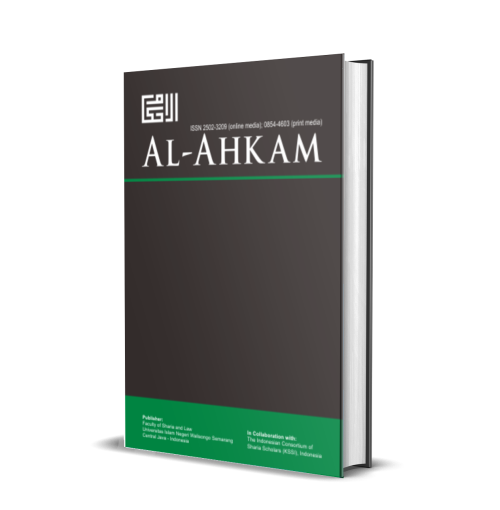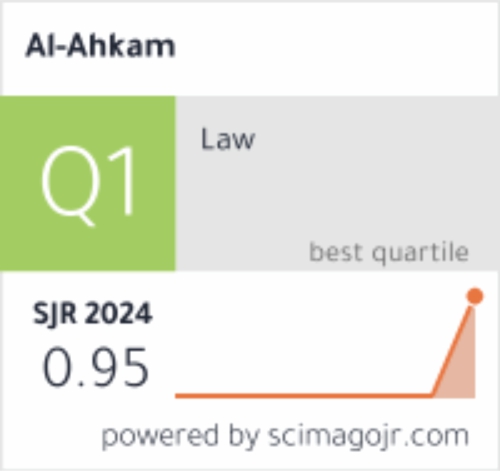Fatwa Institutions in Handling Religious Blasphemy Crimes in Indonesia and Malaysia
DOI:
https://doi.org/10.21580/ahkam.2024.34.1.18624Keywords:
blasphemy, heresy, Jawatankuasa Fatwa, MUIAbstract
The position of fatwa institutions in cases of blasphemy by cult groups is often seen as representing only the majority Muslims and blaming minority Muslims, as in Indonesia, or seen as a tool to suppress anti-government groups, as in Malaysia. This study aims to explain the position of the Indonesian Ulema Council (MUI) and Jawatankuasa Fatwa in handling heresy, including the reasons behind the differences in the positions and roles of the two institutions. Researchers use qualitative methods with a comparative legal approach. This study found that MUI's heretical fatwas had no legal force, the central MUI has the authority to enact heretical fatwas within MUI institutions, but not absolutely to respond to national laws, and not play a role in the criminal justice system. Meanwhile, Jawatankuasa Fatwa Kebangsaan (JFK) has the force of law with certain conditions, however, the federal state Jawatankuasa Fatwa has the authority to determine heretical fatwas to respond and strengthen state regulations (blasphemy laws). This research can be used as a reference for law enforcement in handling blasphemy cases by considering the views of MUI and Jawatankuasa Fatwa, which are regulated adequately by laws and regulations.
Downloads
References
Abidin, Nur Hazirah Zainal, and Zaini Nasohah. The Complexities of Implementing Gazetted Fatwas in Malaysia’s Federal Territories. Mazahib. Vol. 22, 2023. https://doi.org/10.21093/mj.v22i2.5862.
Adji, Oemar Seno. Hukum (Acara) Pidana dalam Prospeksi. Jakarta: Erlangga, 1981.
Ali Rasyid, Fauzan. Kontestasi Agama dan Negara Politik Hukum Penodaan Agama di Asia Tenggara. Bandung: LP2M UIN Sunan Gunung Djati, 2020.
Alnizar, Fariz, Fadlil Munawwar Manshur, and Amir Ma’ruf. ‘Following the Global Rejection: The Motives of Majelis Ulama Indonesia’s Fatwas on Ahmadiyah’. Studia Islamika 29, no. 3 (2023): 519–46. https://doi.org/10.36712/sdi.v29i3.15349.
Alwi, Engku Ahmad Zaki Engku. Ajaran Sesat: Mengenali Jalan yang Terpesong. Selangor: PTS Islamika, 2007.
Arip Purkon, and Mujar Ibnu Syarif. ‘Malaysian Government Policy to Eradicate the Islamic Heretical Sects’. Journal of Namibian Studies : History Politics Culture 34 (2023): 2375–84. https://doi.org/10.59670/jns.v34i.1511.
Arsil, Dian Rositawati, Muhammad Tanziel Aziezi, Nur Syarifah, and Zainal Abidin. Interpretations of Article 156a of the Indonesian Criminal Code on Blasphemy and Religious Defamation (A Legal and Human Rights Analysis). Edited by David Cohen. Jakarta: Lembaga Kajian dan Advokasi Independensi Peradilan (LeIP), 2018.
Asuhaimi, Farhanin Abdullah, Nur Amani Pauzai, Maheran Makhtar, and Khairun-Nisaa Asari. ‘The Role and Position of Fatwa in Malaysian Court’. Pertanika Journal of Tropical Agricultural Science 25, no. S (2017): 227–38. http://www.pertanika.upm.edu.my/pjtas/browse/regular-issue?article=JSSH-S0411-2016.
Azhar, Alias, Baderuddin Mohd Shauki Muhammad, and Mohd Shauki. ‘Kesalahan Ajaran Sesat dalam Kerangu Perundangan dan Fatwa di Negeri Kedah: Satu Tinjauan’. In International Multidisciplinary Academic Conference (TMAC). Perak, 2018.
Buang, Ahmad Hidayat. ‘Fatwa Ajaran Sesat dari Sudut Undang-Undang dan Cabaran Pembanterasannya di Malaysia’. Journal of Fatwa Management and Research 2, no. 1 (2018): 27–47. https://doi.org/10.33102/jfatwa.vol2no1.116.
Crouch, Melissa A. ‘Law and Religion in Indonesia: The Constitutional Court and the Blasphemy Law’. Asian Journal of Comparative Law 7 (2011): 1–46. https://doi.org/10.1017/S2194607800000582.
Cruz, Peter De. A Modern Approach to Comparative Law. Boston: Kluwer, 1993.
Duff, R. A. ‘Defending the Realm of Criminal Law’. Criminal Law and Philosophy 14, no. 3 (2020): 465–500. https://doi.org/10.1007/s11572-020-09548-3.
Fathoni, Ahmad. ‘Sejarah Sosial Hukum Islam di Asia Tenggara: Studi Pemberlakuan dan Pengkodifikasian Hukum Islam di Malaysia’. asy-Syari’ah 17, no. 1 (2014): 188–93. https://doi.org/10.15575/as.v17i1.638.
Flango, Victor E., Donald C. Bross, and Sarah Corbally. ‘Amicus Curiae Briefs: The Court’s Perspective’. Justice Sistem Journal 27, no. 2 (2006): 180–90. https://doi.org/10.1080/0098261X.2006.10767799.
Hamzah, Andi. Delik-Delik Tertentu (Sepiciale Delicten) di dalam KUHP. Jakarta: Sinar Grafika, 2016.
Hamzah, Andi. Hukum Acara Pidana Indonesia. Jakarta: Sinar Grafika, 2016.
Hapsin, Abu. ‘How to Make Islamic Law as the State Legal Policy of Indonesia: Constitutional and Sociological Arguments’. al-Ahkam 27, no. 2 (2017): 139–56. https://doi.org/10.21580/ahkam.2017.27.2.1918.
Harimurti, Yudi, Encik Fauzan, Indah Purbasari, and Indra Yulianingsih. ‘The Role of Majelis Ulama Indonesia and Its Fatwas within the Indonesian Governance System’. In Proceedings of the International Conference on Environmental and Technology of Law, Business and Education on Post Covid 19, ICETLAWBE 2020, 26 September 2020, Bandar Lampung, Indonesia. Bandar Lampung: EAI, 2020. https://doi.org/10.4108/eai.26-9-2020.2302535.
Hasyim, Syafiq. ‘Fatwa Aliran Sesat dan Politik Hukum Majelis Ulama Indonesia (MUI)’. al-Ahkam 25, no. 2 (2015): 241–66. https://doi.org/10.21580/ahkam.2015.25.2.810.
Hazairin. Demokrasi Pancasila. Jakarta: Bina Aksara, 1985.
Hicks, Jacqueline. ‘Heresy and Authority: Understanding the Turn against Ahmadiyah in Indonesia’. South East Asia Research 22, no. 3 (2014): 321–39. https://doi.org/10.5367/sear.2014.0216.
Hidayati, Tri, Muhammad Syarif Hidayatullah, Parman Komarudin, and Atika Atika. ‘Digitalization of Islamic Finance: Epistemological Study of the National Sharia Board-Indonesian Council of Ulama’s Fatwa’. al-Ahkam 33, no. 2 (2023): 255–78. https://doi.org/10.21580/ahkam.2023.33.2.17324.
Hosen, N. ‘Behind the Scenes: Fatwas of Majelis Ulama Indonesia (1975-1998)’. Journal of Islamic Studies 15, no. 2 (2004): 147–79. https://doi.org/10.1093/jis/15.2.147.
Ichwan, Moch. Nur. ‘“Ulamā”, State and Politics: Majelis Ulama Indonesia after Suharto’. Islamic Law and Society 12, no. 1 (2005): 45–72. https://doi.org/10.1163/1568519053123867.
Idris, Asmady, Shahril Yusof, Suraya Sintang, and Issraq Ramli. ‘Dasar Kerajaan Negeri Sabah Menangani Perkembangan Ajaran Sesat dalam Islam (Sabah State Policy in Dealing with the Development of Deviant Teachings in Islam)’. UMRAN - International Journal of Islamic and Civilizational Studies 7, no. 1 (2020): 49–67. https://doi.org/10.11113/umran2020.7n1.358.
Kleinfeld, Joshua. ‘Three Principles of Democratic Criminal Justice’. Northwestern University Law Review 111, no. 6 (2017): 1455–90. https://scholarlycommons.law.northwestern.edu/nulr/vol111/iss6/5/
Krislov, Samuel. ‘The Amicus Curiae Brief: From Friendship to Advocacy’. The Yale Law Journal 72, no. 4 (1963): 694–721. https://doi.org/10.2307/794698.
Lee, Ambrose Y. K. ‘Public Wrongs and the Criminal Law’. Criminal Law and Philosophy 9, no. 1 (2015): 155–70. https://doi.org/10.1007/s11572-013-9231-z.
Mahyudin, Daud. ‘Pendalilan Berasaskan Ayat al-Ahkam dalam Penghujahan Hukum Islam Semasa: Kajian Perbandingan di antara Fatwa Malaysia dan Brunei Darussalam’. Thesis. Universiti Malaya, 2017.
Majelis Ulama Indonesia. Pedoman Penyelenggaraan Organisasi Majelis Ulama Indonesia. Jakarta: Majelis Ulama Indonesia, 2011.
Mat Salleh, Mohd Kamel, Adibah Bahori, and Mohamad Azhan Yahya. ‘Position of Fatwa in the Constitution: A Legal Analysis’. Pertanika Journal of Social Sciences and Humanities 29, no. 4 (2021): 2171–88. https://doi.org/10.47836/pjssh.29.4.04.
Mudzhar, Atho, Choirul Fuad Yusuf, Ma’ruf Amin, Ichwan Syam, Slamet Efendi Yusuf, and Noor Ahmad. Fatwa Majelis Ulama Indonesia (MUI) dalam Perspektif Hukum dan Peraturan Perundang-Undangan. Edited by Nahar Nahrawi, Nuhrison M. Nuh, Asrorun Niam Sholeh, Zaenal Abidin, A. M. Khaolani, Ali Akbar, Huriyudin Asep Saefullah, and Arif Syibromalisi. Jakarta: Puslitbang Kehidupan Keagamaan Badan Litbang dan Diklat Kementrian Agama RI, in collaboration with Majelis Ulama Indonesia (MUI), 2012.
Muhyiddin, Muhyiddin. ‘Fatwa MUI tentang Vasektomi: Tanggapan Ulama dan Dampaknya terhadap Peningkatan Medis Operasi Pria (MOP)’. al-Ahkam 24, no. 1 (2014): 69–92. https://doi.org/10.21580/ahkam.2014.24.1.134.
Nasohah, Zaini. ‘Undang-Undang Penguatkuasaan Fatwa di Malaysia’. Islāmiyyāt: International Journal of Islamic Studies 27, no. 1 (2005): 25–44.
Olle, John. ‘The Majelis Ulama Indonesia Versus “Heresy”: The Resurgence of Authoritarian Islam’. In State of Authority, edited by Gerry Van Klinken and Joshua Barker, 95–116. Ithaca, NY: Cornell University Press, 2019. https://doi.org/10.7591/9781501719448-005.
Othman, Zarina, Nor Azizan Idris, and Abdul Halim Daud. ‘Shia Belief and National Security in Malaysia: The Securitisation’. Jurnal Akidah & Pemikiran Islam 24, no. 2 (2022): 169–204. https://doi.org/10.22452/afkar.vol24no2.5.
Patterson, Edwin W. The Legal Philosophies of Lask, Radbruch, and Dabin. Edited by Kurt Wilk. Cambridge: Harvard University Press, 1950. https://doi.org/10.4159/harvard.9780674493025.
Pratiwi, Cekli Setya, and Sidik Sunaryo. ‘Blasphemy Law as a Structural Violence: A Challenge for Maintaining Sustainable Peace’. Muslim World Journal of Human Rights 18, no. 1 (2021): 133–65. https://doi.org/10.1515/mwjhr-2020-0019.
Ratnam, K. Sejarah Malaysia. Selangor: Logman, 1996.
Rosyid, Maskur. ‘Reading Fatwas of MUI a Perspective of Maslahah Concept’. Syariah: Jurnal Hukum dan Pemikiran 19, no. 1 (2019): 91–117. https://doi.org/10.18592/sjhp.v19i1.2726.
Shiozaki, Yuki. ‘The Historical Origins of Control over Deviant Groups in Malaysia: Official Fatwá and Regulation of Interpretation’. Studia Islamika 22, no. 2 (2015): 205–32. https://doi.org/10.15408/sdi.v22i2.1917.
Shiozaki, Yuki, and Hiroko Kushimoto. ‘Reconfigurations of Islamic Authority in Malaysia’. Asian Journal of Social Science 42, no. 5 (2014): 602–19. https://doi.org/10.1163/15685314-04205007.
Sidqi, Imaro, and Doli Witro. ‘Kedudukan Fatwa Majelis Ulama Indonesia (MUI) dalam Perspektif Hukum Islam dan Nasional: Studi Implikasi Fatwa terhadap Masyarakat’. Nizham Journal of Islamic Studies 8, no. 1 (2020): 20–31. https://doi.org/10.32332/nizham.v8i01.2103.
Sulong, Jasni. ‘Pemeliharaan Akidah Islam: Analisis daripada Sudut Penguatkuasaan Undang-Undang dan Fatwa di Pulau Pinang’. Jurnal Akidah & Pemikiran Islam 18 (2016): 1–34. https://doi.org/10.22452/afkar.sp2016no1.1.
Vogenauer, Stefan. ‘Sources of Law and Legal Method in Comparative Law’. In The Oxford Handbook of Comparative Law, edited by Mathias Reimann and Reinhard Zimmermann, 875–901. Oxford University Press, 2019. https://doi.org/10.1093/oxfordhb/9780198810230.013.28.
Willya, Evra, Ahmad B. Bintang Maronrong, and Sabil Mokodenseho. ‘The Enforcement of MUI Fatwa Number 1 of 2003 Concerning Copyright for Merchants Selling Pirated VCD and DVD in Manado City’. al-Ahkam 31, no. 2 (2021): 183–202. https://doi.org/10.21580/ahkam.2021.31.2.8638.
Downloads
Published
How to Cite
Issue
Section
License
By submitting an article to the journal, the author(s) agree to transfer the published article's copyright to the journal, which will act as the publisher. This means the journal will have the right to publish the article in various forms, including reprints. The journal will maintain the publishing rights to the published articles.
In line with the license, authors and third parties (readers, researchers, and others) are allowed to share and adapt the material. In addition, the material must be given appropriate credit, provided with a link to the license, and indicated if changes were made. If authors remix, transform or build upon the material, authors must distribute their contributions under the same license as the original.



